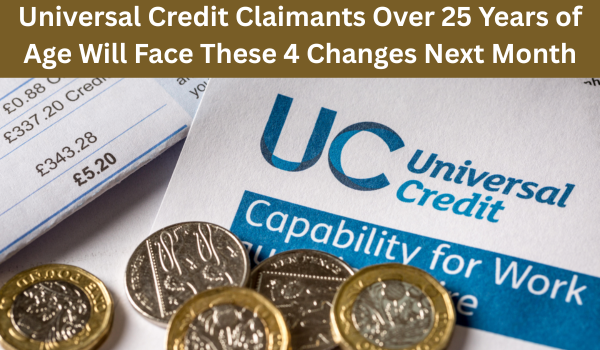Millions of Universal Credit Claimants Over 25 Years of Age Will Face These 4 Changes Next Month as a part of Important Adjustments. The changes, aimed at simplifying support and tightening conditions, will begin next month for those aged over 25.
Universal Credit Claimants Over 25 Years of Age Will Face These 4 Changes Next Month
From next month, the Department for Work and Pensions (DWP) is rolling out a set of four changes specifically targeting Universal Credit recipients aged 25 and above. The adjustments will impact how much claimants receive, how they qualify for benefits, and what is expected from them in return.
These reforms are part of a broader government strategy to encourage more people into employment while maintaining targeted support for vulnerable groups. As a result, many claimants may need to re-evaluate their job search approach, budgeting, and benefit planning.
1. Increased Work Search Requirements
Claimants aged 25+ will now face stricter work search expectations.

Under the revised rules:
- They must spend a minimum of 35 hours per week on job-seeking activities unless medically exempt.
- More frequent meetings with Work Coaches will be required.
- Non-compliance may lead to sanctions such as reduced payments.
This change is designed to align with the government’s drive to reduce unemployment among able-bodied adults.
2. Adjusted Housing Cost Contributions
Another change coming into effect is the reassessment of housing costs. Previously, the government granted a flat housing cost element. Now, claimants living with non-dependent adults (like adult children or roommates) will see reductions in their housing support.
The Non-Dependent Deduction (NDD) will increase to £93.30 per month, which could significantly lower the total monthly benefit some claimants receive.
3. New Income Thresholds for Tapering
The taper rate — the amount by which Universal Credit is reduced as earnings rise — remains at 55%. However, income thresholds are being revised, which means:
| Household Type | New Threshold Before Deductions |
|---|---|
| Single (25+) without children | £677/month |
| Couple (25+) with children | £1,093/month |
Claimants earning above these thresholds will experience faster reductions in benefits, especially those with additional income from part-time work.
4. Digital Reporting Mandatory for All
From next month, all Universal Credit claimants aged 25 and above must report their activities, changes in circumstances, and job applications exclusively through the online Universal Credit journal.
This change intends to modernize the benefits system, but it raises concerns among digitally excluded individuals. Those unfamiliar with online systems are advised to contact local Jobcentre Plus offices for support or digital literacy training.
DWP’s Justification for the Reforms
The Department states these updates are necessary to “support economic productivity and better tailor Universal Credit to current labour market conditions.” DWP also assures that exemptions will still apply for those with disabilities or caring responsibilities, who will continue to receive flexibility under these rules.
The reforms will undergo a 6-month review to assess their impact on claimant employment and financial outcomes.
What Should Claimants Do Now?
Claimants should:
- Review their Universal Credit journal regularly for updates.
- Begin job-seeking preparations based on the new time commitments.
- Speak with their Work Coach to discuss any exemptions or health conditions.
- Organise proof of housing arrangements to minimise housing payment cuts.
With these new rules rolling out, staying informed and prepared will be key to avoiding payment disruptions and maintaining eligibility.


